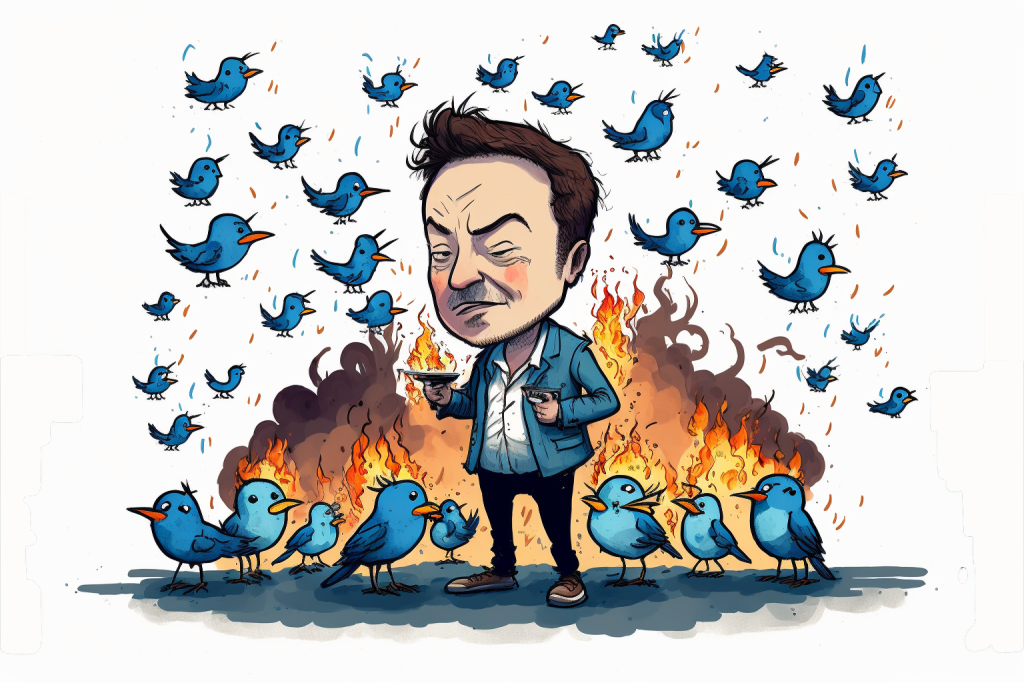For the past few weeks, I’ve been checking Twitter a little more often than usual, simply to see if it’s still there. Elon Musk’s takeover of the platform has provided proof, for anyone who still needed it, that putting an eccentric billionaire strongman in charge is never the solution to a problem. But there are also subtler lessons in democracy we can draw from Twitter’s present malaise.
The news that the world’s richest man intended to buy one of the world’s most influential social media platforms quickly divided users into two camps. There was a hard core of Musk fans who bought into his promises of “free speech” and an unrestricted “marketplace of ideas.” And there were those who feared the worst – a decline in measures to combat hate speech, the reinstatement of accounts known to spread disinformation, and perhaps even the end of Twitter as we know it.
Vox populi? Elon Musk’s Idea of Democracy
What we have witnessed so far is the destabilisation of a platform used as a central form of communication by hundreds of millions of people, all on the whim of one man and his “vision” – dressed up in the guise of an exercise in radical democracy.
Throughout the process of acquiring Twitter, Musk repeatedly insisted that he was doing it in the name of free speech and democracy. In the last few weeks, Musk has run a series of Twitter polls – should Donald Trump’s account be reinstated? Should there be a general amnesty for banned accounts?
At the end of every one of his polls, he has taken to signing off: vox populi vox dei – “the voice of the people is the voice of God.” Musk’s strategy is clear: he wants to add an outward appearance of democracy to the decisions he had already taken before acquiring the platform.
Social Media and Democracy Technology
Musk is right about one thing: The online space represents a huge opportunity for democracy. At its best, it connects people from all over the world, from radically different backgrounds, and allows for an exchange on an equal footing of a kind unimaginable in the past.
The democracy technology tools we write about on this site operate on a far smaller scale than big social media channels. This is by design. They provide spaces for local populations to communicate with elected officials, or to deliberate in a dedicated space not based on a competition for attention, but on the principle of giving everyone a chance to contribute.
Yet whether Twitter survives the coming weeks or not, big social media will continue to provide a template for how these tools work, and how people interact in online spaces. Furthermore, they will continue to shape our democracies, and our world.
There’s no denying that Twitter has brought many benefits: unfiltered news of the protests in Iran is only the latest example of social media supporting a vital social movement. Yet it is simply naive to believe that, in an online space shaped by financial interests and the attention economy, discussions on social media will happen in a fair and equal way if we simply remove all barriers, and allow a free-for-all.
Nobody benefits from a marketplace of ideas located in a billionaire’s back garden (apparently not even the billionaire himself, Musk having shed $100 billion US of his worth since the acquisition). Online spaces need to be regulated democratically – and that doesn’t mean using the occasional twitter poll whenever the owner happens to feel like it (it apparently didn’t strike him as necessary when he was laying off around 3,700 staff by email, for example). Governments and experts have an important role to play in this process. But above all, it should be for the people to decide.

Regulation by the People
The EU has already begun tackling this problem with the Digital Services Act and Digital Markets Act, due to be introduced over the course of the next two years. Even more encouraging are the developments in Canada. In September, the Canadian Citizens’ Assembly on Democratic Expression published its report. Over the course of a series of in person and online deliberation sessions, they came up with a set of recommendations for reducing online harms and safeguarding human rights in Canada.
Among them was the proposal to establish a new, impartial Digital Services Regulator (DSR) to establish and enforce regulations and standards governing digital media. Among other things, the regulatory body would ensure that digital service providers “are held accountable for the dissemination of harmful and hateful speech, and for their own systemic failures to use due diligence in moderating content and restraining abusive users.” Failure to comply would result in fines for the service provider.
This was a real exercise in democracy, a long way from a clickbait twitter poll. Citizens were given the chance to deliberate, resulting in a comprehensive set of proposals which would put the regulation of online media in public hands. Vox populi.
